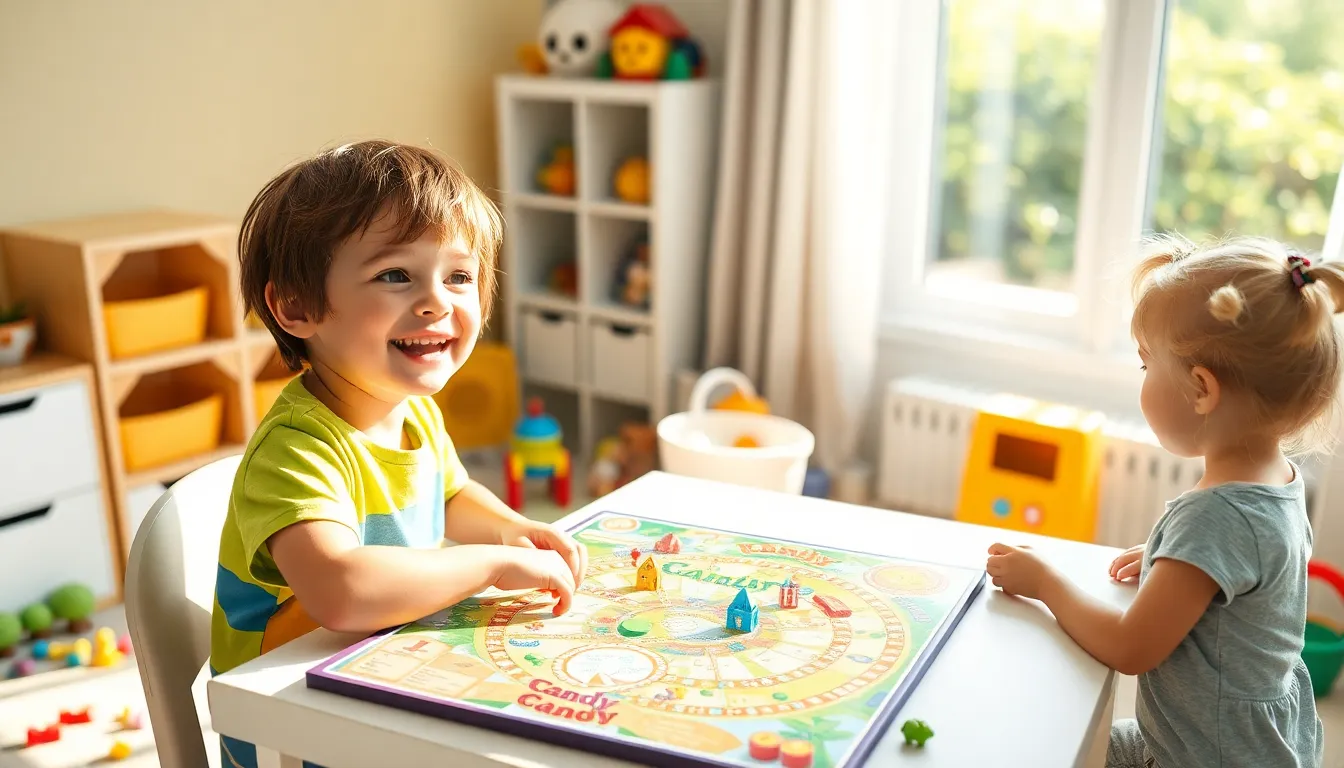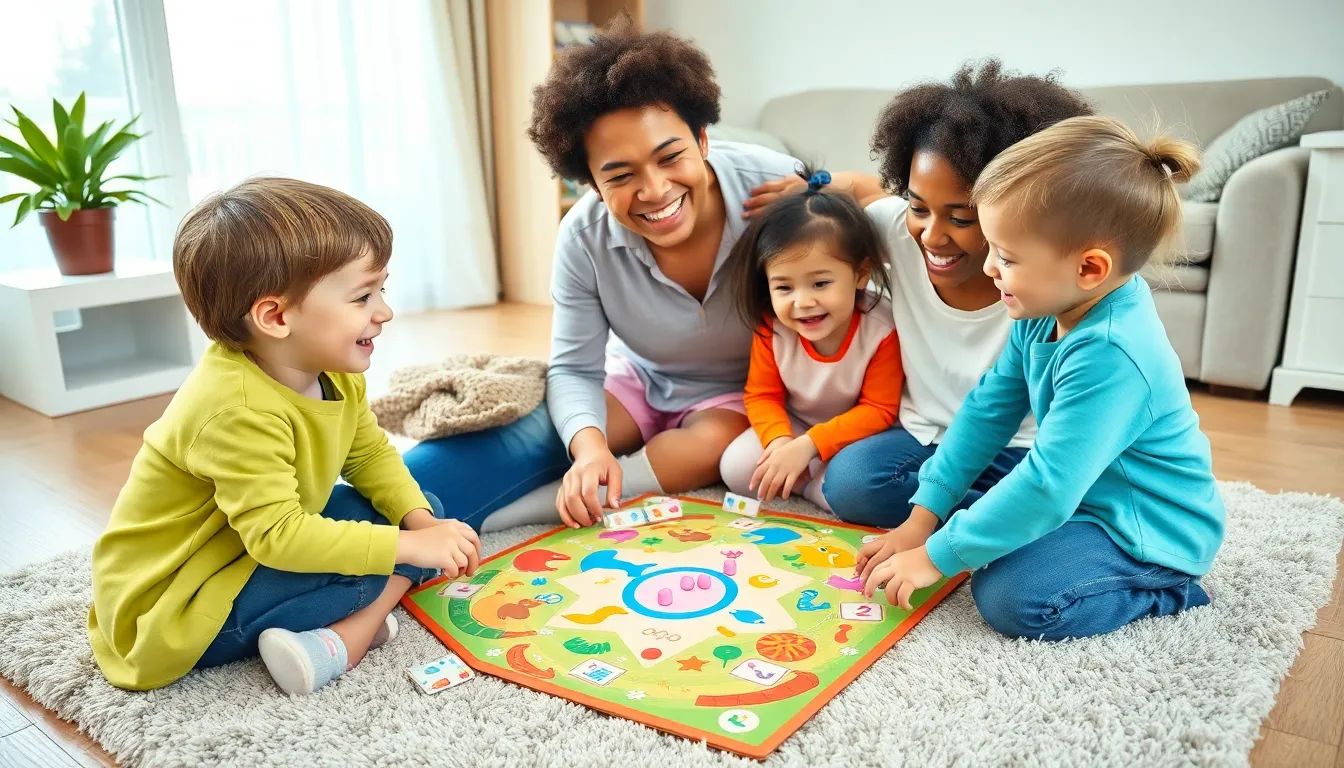Table of Contents
ToggleIn a world where screens seem to rule, board games for preschoolers offer a refreshing escape into the land of imagination and laughter. These delightful games not only spark joy but also foster essential skills like teamwork and critical thinking. Who knew that a colorful board and a handful of dice could turn a rainy afternoon into an epic adventure?
Benefits of Board Games for Preschoolers
Board games for preschoolers offer a range of developmental benefits. They enhance social interaction while fostering essential skills.
Social Skills Development
Playing board games promotes social skills among preschoolers. Children learn to communicate effectively while taking turns. Handling wins and losses teaches emotional regulation. Sharing experiences fosters cooperation and teamwork, crucial components of social interaction. Through engaging gameplay, preschoolers develop friendships and learn to navigate social dynamics. Board games also provide opportunities for caregivers to engage alongside children, reinforcing bonds and collaborative play.
Cognitive Skill Enhancement
Cognitive skills improve significantly through board games. Preschoolers practice problem-solving as they navigate game challenges. Recognizing patterns and making strategic decisions enhance critical thinking. Memory skills sharpen when recalling game rules and previous turns. Board games introduce counting and basic math concepts, laying foundations for future learning. Engaging in discussions about game strategies encourages verbal communication and language development, making board games both educational and enjoyable.
Top Board Games for Preschoolers


Board games designed for preschoolers captivate young minds while promoting essential skills. Here are two excellent options.
Game 1: Candy Land
Candy Land introduces preschoolers to a world of colors and simple gameplay. It focuses on turn-taking, where players draw cards to advance along a colorful path. Children learn basic counting skills while enjoying whimsical locations. The game enhances social interaction, as kids celebrate victories together. Candy Land’s vibrant artwork keeps players engaged, making it a delightful choice for family game nights.
Game 2: Hi Ho! Cherry-O
Hi Ho! Cherry-O offers a fun way for preschoolers to practice counting and fine motor skills. Players collect fruits from their trees, requiring strategic thinking about when to gather. This game fosters turn-taking and patience, as children eagerly wait for their turns. The cheerful design captures attention while teaching basic math concepts. Hi Ho! Cherry-O provides a lively, educational experience for children and caregivers alike.
Tips for Choosing Board Games for Preschoolers
Selecting board games for preschoolers involves considering several important factors. Understanding these criteria ensures a rewarding and fun gaming experience.
Age Appropriateness
Age appropriateness plays a crucial role in game selection. Choose games specifically designed for preschool-aged children, typically ranging from 3 to 5 years old. Look for games that include simple rules and engaging themes. Games labeled with a clear age range on the packaging help prevent frustration and enhance enjoyment. For example, Candy Land suits younger preschoolers due to its straightforward gameplay, while Hi Ho! Cherry-O engages slightly older ones with basic strategies. Ensuring that the game matches the child’s developmental stage fosters independence and confidence during play.
Gameplay Duration
Optimal gameplay duration is important for maintaining a child’s interest. Look for games with an average playtime of 15 to 30 minutes to match the attention spans of preschoolers. Shorter games prevent children from losing focus and help cultivate a positive gaming experience. Consider Candy Land’s quick turns, which allow for re-engagement when players complete their turns. Games with adjustable playtime offer flexibility, accommodating different group sizes and varying attention levels. Choosing games with manageable duration supports retention and promotes repeated play.
Board games are a fantastic way for preschoolers to learn and grow while having fun. They not only entertain but also nurture vital skills like teamwork and communication. Engaging in these games creates memorable moments that strengthen relationships between children and caregivers.
Selecting the right board games can make all the difference. By focusing on age-appropriate choices with simple rules and engaging themes, caregivers can ensure that playtime is both enjoyable and educational. Games like Candy Land and Hi Ho! Cherry-O are perfect examples of how play can lead to valuable learning experiences.
Ultimately, incorporating board games into a child’s routine can lead to lasting benefits that extend beyond the game itself. It’s an investment in their development that pays off in countless ways.




